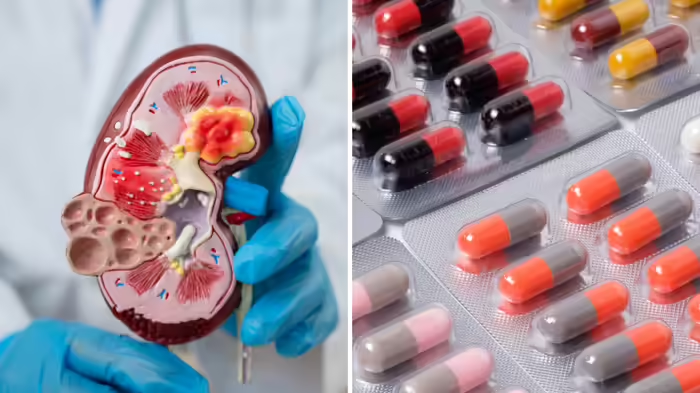
By Surendra Agrawal | NavbharatTimes.com • 15 Nov 2025 | 1:51 PM
The kidneys work round the clock — 24 hours a day — to filter waste, maintain fluid balance, and regulate blood pressure. While diabetes, unhealthy lifestyle habits, and genetic factors are well-known causes of kidney disease, very few people realise that several commonly used medicines can also harm the kidneys.
According to a study published in The Lancet, an estimated 138 million Indians were living with chronic kidney disease (CKD) by 2023, marking a significant rise compared to previous years. Experts warn that CKD is a silent and progressive condition that can eventually become life-threatening.
What is even more alarming is that misuse of medicines has become a major contributor to kidney damage. With growing access to information, many people self-medicate without proper medical advice. Prolonged or incorrect use of certain medicines increases the load on the kidneys, gradually impairing their function.
Here are the five categories of medicines that can negatively affect the kidneys. These should only be taken strictly under a doctor’s supervision, with the right dosage and duration.
1. Non-Steroidal Anti-Inflammatory Drugs (NSAIDs)
These are among the most commonly misused medicines. NSAIDs are taken for pain relief, but according to the NIH, they also suppress the production of prostaglandins — molecules that keep the blood vessels in the kidneys relaxed.
Regular or long-term use can reduce kidney blood flow and trigger acute kidney injury.
2. Aminoglycoside Antibiotics
These antibiotics are used to treat severe bacterial infections. However, incorrect or prolonged use can produce harmful free radicals, damaging the proximal tubular cells of the kidneys.
Even after the drug is stopped, the kidney may not fully recover.
3. Vancomycin and Other Glycopeptide Antibiotics
These powerful antibiotics are often prescribed for resistant infections. But higher doses are linked to kidney toxicity, especially when combined with other nephrotoxic drugs.
Monitoring is essential for patients at risk.
4. Radiocontrast Agents
Contrast dyes used in CT scans, angiography, and other imaging procedures can cause contrast-induced nephropathy.
These agents may reduce kidney blood flow and increase oxidative stress.
People with pre-existing kidney disease are at much higher risk.
5. Medicines Affecting Kidney Hemodynamics
ACE inhibitors and ARBs are commonly prescribed for hypertension, heart failure, and kidney disorders.
While often beneficial, in certain conditions these medicines may temporarily reduce the kidney’s filtration ability, affecting overall function.
Disclaimer
This article is intended for general awareness only. Navbharat Times does not guarantee its accuracy or effectiveness. This content is not a substitute for professional medical advice. Always consult a doctor before taking any medication.
I
Discover more from SD NEWS agency
Subscribe to get the latest posts sent to your email.
